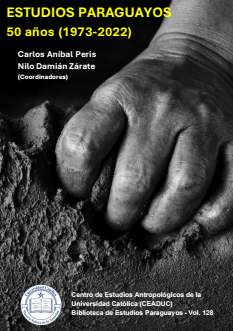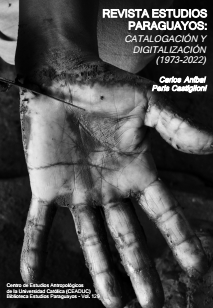Introduction to contemporary economics in Paraguay: agro-livestock production and economic elites
DOI:
https://doi.org/10.47133/respy41-23-2-13Keywords:
Paraguay, contemporary economy, productive Gremios, economic elitesAbstract
This paper analyzes the forms of wealth reproduction and the concentration of wealth in Paraguay, strongly centered on the export of primary products, especially associated with soybean and cattle production in large-scale farms. It briefly reconstructs the political and state development that enables the wealth production environment, identifying the productive associations (gremios) that represent the interests of the most prolific sectors of the primary export economy. It also proposes a comparative look at poverty and inequality. The article compares the National Agricultural Censuses of 1991, 2008 and 2022, providing some analytical lines around land tenure, variation in the products and farm sizes. In addition, it analyzes data from the National Institute of Statistics to investigate monetary poverty and income inequality. Finally, it also draws on in-depth interviews with relevant actors within the sectoral associations.
Downloads
References
Arce, L., & Rojas, G. (2020). "Paraguay [369-426]". In Cálix, Á., & Blanco, M. (coord.) Los desafíos de la transformación productiva en América Latina. Perfiles nacionales y tendencias regionales. Volume II. Cono Sur. México: Friedrich-Ebert-Stiftung.
Borda, D., & Caballero, M. (2018). Una reforma tributaria para mejorar la equidad y la recaudación. Asunción: CADEP.
Cavarozzi, M., & Abal Medina, J.M. (2002). El Asedio a la política: los partidos latinoamericanos en la era neoliberal. Buenos Aires: HomoSapiens Ediciones.
De Iturbe, C. (2017). Equidad tributaria. Asunción: Decidamos.
Ezquerro-Cañete, A. (2020). "La lucha de clases por la tierra y por la democracia en Paraguay". Estudios críticos del desarrollo X(18): 97-144.
Fairfield, T. (2015). Private Wealth and Public Revenue in Latin America. Business Power and Tax Politics. New York: Cambridge University Press.
FAO (2020). Global Forest Resource Assessment 2020. Main report. Italia. https://doi.org/10.4060/ca8753es
Florentín Portillo, J.L. (2021). "Conocimiento y cumplimiento tributario en el Paraguay desde la perspectiva del sector empresarial". Saeta digital Contabilidad, Marketing y Empresa 6(1): 24-44.
Fogel, R. (2019). "Desarraigo sin proletarización en el agro paraguayo". Íconos. Revista de Ciencias Sociales (63): 37-54. https://doi.org/10.17141/iconos.63.2019.3423
Fogel, R. (2020). "Dimensiones relevantes para el estudio del régimen agroalimentario neoliberal". Revista Novapolis 16: 11-27. http://pyglobal.com/ojs/index.php/novapolis/article/view/111/117
Fogel, R., Paredes, R., & Valdez, S. (2022). "The Paradoxes of a Progressive Constitution and Neoliberal Food Regime". In Chadwick, A., Lozano-Rodríguez, E., Palacios-Lleras, A., & Solana, J. (Eds.). Markets, Constitutions, and Inequality (1st ed.). Routledge. https://doi.org/10.4324/9781003202257
Global Forest Watch (2022). Forest monitoring. https://www.globalforestwatch.org/dashboards/country/PRY
Guereña, A., & Rojas Villagra, L. (2016). Yvy Jára. Los dueños de la tierra en Paraguay. Asunción: OXFAM.
Hetherington, K. (2011). Guerrilla Auditors: The Politics of Transparency in Neoliberal Paraguay. Duke University Press.
INE (2022a). Compendio estadístico 2020.
INE (2022b). Principales resultados de pobreza monetaria y distribución de ingresos 2021.
INE (2021a). Desigualdad de Ingresos. EPH 1997/98 al 2021. Serie comparable. Encuesta Permanente de Hogares 1997/98-2016 y Encuesta Permanente de Hogares Continua 2017-2021.
INE (2021b). Índice de pobreza Multidimensional. 2016-2021. Encuesta Permanente de Hogares 2016 y Encuesta Permanente de Hogares Continua 2017-2021.
INE (2021c). La ocupación informal en Paraguay. Encuesta Permanente de Hogares Continua 2021
López, M. (2020). "Traditionalism in the contemporary political elite of Paraguay". European Review of Latin American and Caribbean Studies (110): 59–77. http://doi.org/10.32992/erlacs.10522
López, M. (in press). "Mucho más que solo económicos. La construcción política de los gremios agroganaderos en Paraguay". Latin American Perspectives, Especial Issue
Long, T., & Urdinez, F. (2020). "Status at the Margins: Why Paraguay Recognizes Taiwan and Shuns China". Foreign Policy Analysis 17(1). https://doi.org/10.1093/fpa/oraa002
Martens, J. (2019). "Entre grupos armados, crimen organizado e ilegalismo: Actores e Impactos Políticos y Sociales de la Violencia en la Frontera Noreste de Paraguay con Brasil". Abya-Yala: Revista sobre Acceso a la Justicia y Derechos en las Américas 3(3): 65- 87. https://doi.org/10.26512/abyayala.v3i3.30201
Masi, F. (2016). Ser industrial en el Paraguay. 15 historias recientes. Asunción: CADEP.
Ministry of the Treasury (2022). Foreign Trade Report. Undersecretary of State for Economics. National Government.
Ministry of Agriculture and Livestock (2020). Statistical synthesis. Agricultural production. 2019.
Ministry of Agriculture and Livestock (2009). National Agricultural Census, 2008.
Moriconi, M., & Peris, C. (2018). "Análisis sobre el tráfico de drogas en la ciudad de Pedro Juan Caballero". Religación. Revista de Ciencias Sociales y Humanidades 3(9), 202-215.
Ortiz Sandoval, L. (2020). "Bases y criterios de análisis de las clases en la sociedad paraguaya". Revista Población y Desarrollo 26 (50): 76-95. http://doi.org/10.18004/pdfce/2076-054x/2020.026.50.076-095
UN (2020). Deforestation has slowed down but still remains a concern, new UN report reveals. UN News– Global Perspectives, Human Stories. https://news.un.org/en/story/2020/07/1068761
Ortíz, L., & Rojas, G. (2019). "Elites empresariales y proceso de democratización en Paraguay". Íconos Revista de Ciencias Sociales XXIII (65): 199–220.
Palau, T. (2010). "La política y su trasfondo: el poder real en Paraguay". Nueva Sociedad (229): 134-150.
Riquelme, Q. (2003). Los sin tierra en Paraguay. Conflictos Agrarios y movimientos campesinos. Buenos Aires: CLACSO
Rojas, L. (2014). La metamorfosis del Paraguay: del esplendor inicial a su traumática descomposición. Asunción: BASE-US, Fundación Rosa Luxemburgo.
Rojas, L. (2015). "Historia y actualidad del neoliberalismo en Paraguay" [85-102] in Rojas, L. (Coord.) Neoliberalismo en América Latina. Crisis, tendencias y alternativas. Asunción: CLACSO.
Sotelo Valencia, A. (2018). "Subimperialismo y dependencia en la era neoliberal". Cuaderno CRH 31(84): 501-517. https://doi.org/10.1590/S0103-49792018000300005
Tamayo, E. (2018). 'Paraguay, repensando la política exterior'. Novapolis 13, 141-162.
Universidad Nacional de Asunción (2020). Soja. Datos, estadísticas y comentarios. Facultad de Ciencias Agrarias. https://www.agr.una.py/ecorural/cultivo/soja_enero_2020.pdf
Vice Ministry of Mines and Energy (2020). Preliminary report on electric energy. Ministry of Public Works and Communications.
Vuyk, C. (2014). Subimperialismo brasileño y dependencia del Paraguay: los intereses económicos detrás del golpe de Estado de 2012. Asunción: CyP.
Downloads
Published
How to Cite
Issue
Section
License
Copyright (c) 2023 Magdalena López y Revista Estudios Paraguayos

This work is licensed under a Creative Commons Attribution 4.0 International License.
















